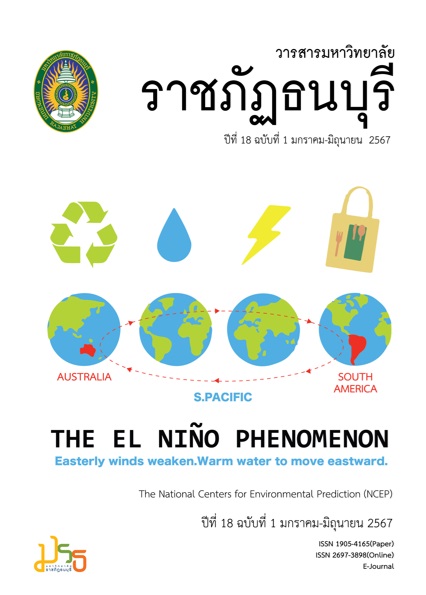Using ChatGPT to Improve English Grammar Skills for EFL Learners
คำสำคัญ:
ChatGPT, Language learning, English grammar skills, EFL learnersบทคัดย่อ
This article explores the transformative potential of ChatGPT in enhancing English grammar skills for EFL learners. The study showcases ChatGPT’s proficiency in Natural Language Processing (NLP) and its versatile applications in grammatical error correction and educational support. By detailing its role in personalized learning experiences, including real-time feedback, dialogue creation, and contextual understanding, the article presents research findings highlighting the significant reduction in grammar errors among EFL majors through personalized assignments with ChatGPT. The tool’s adaptability as a function complement to human language teachers, along with its anytime accessibility, is a valuable resource in language education. This research underscores ChatGPT’s potential as a dynamic, AI-driven solution for improving English grammar skills, offering learners a platform for prompt-based learning, instant feedback, and personalized exercises, thereby contributing to measurable enhancements in grammar proficiency.
Downloads
เอกสารอ้างอิง
Ahmadi, M.R. (2018). The Use of Technology in English Language Learning: A Literature Review. International Journal of Research in English Education (IJREE). 3 (2), pp. 116-122.
Ahmed, M.A. (2023). ChatGPT and the EFL Classroom: Supplement or Substitute in Saudi Arabia’s Eastern Region. Information Sciences Letters, An International Journal. 12 (7), pp. 2731. Retrieved December 15, 2023, from http://dx.doi.org/10.18576/isl/120704.
Ali, A.M. (2023). An Intervention Study on the Use of Artificial Intelligence in the ESL Classroom: English teacher perspectives on the Effectiveness of ChatGPT for Personalized Language Learning. Master of Arts in Upper Secondary Education, 300 credits English Studies and Education.
Barrot, J.S. (2023). ChatGPT as a Language Learning Tool: An Emerging Technology Report. College of Education, Arts and Sciences, National University.
Baskara, R. (2023). Integrating ChatGPT into EFL writing instruction: Benefits and challenges. International Journal of Education and Learning. 5 (1), pp. 44-55. Retrieved December 15, 2023, from https://repository.usd.ac.id/46683/1/9773_858-3369-2-PB.pdf.
Baskara, R. & Mukarto. (2023). Exploring the Implications of ChatGPT for Language Learning in Higher Education. Indonesian Journal of English Language Teaching and Applied Linguistics. 7 (2), pp. 343-358. Retrieved December 15, 2023, from https://files.eric.ed.gov/fulltext/EJ1391490.pdf.
Boyd, T. (2024). Grammarly vs ChatGPT (2024): In-depth AI Tools Comparison!. Retrieved February 20, 2023, from https://myclasstracks.com/grammarly-vs-chatgpt/.
Božić, V. & Poola, I. (2023). Chat GPT and education. Retrieved December 15, 2023, from 10.13140/RG.2.2.18837.40168.
Brown, T. B., Mann, B., Ryder, N., Subbiah, M., Kaplan, J., Dhariwal, P., … Amodei, D. (2020). Language Models are Few-Shot Learners. OpenAI, Johns Hopkins University.
Cao, S. & Zhong, L. (2023). Exploring the effectiveness of ChatGPT-based feedback compared with teacher feedback and self-feedback: Evidence from Chinese to English translation. School of Foreign Languages, Southeast University.
Coyne, S., Sakaguchi, K., Galvan-Sosa, D., Zock, M., & Inui, K. (2023). Analyzing the Performance of GPT-3.5 and GPT-4 in Grammatical Error Correction. Department of System Information Sciences, Tohoku University.
Daar, G.F. (2020). Problems of English Language Learning in Context (Based on some Studies in Manggarai). Manggarai: PKBM Sambi Poleng.
Debata, P.K. (2013). The Importance of Grammar in English Language Teaching: A Reassessment. Language in India. 13 (5), pp. 48. Retrieved December 15, 2023, from https://www.researchgate.net/publication/279949868_The_Importance_
of_Grammar_in_English_Language_Teaching_A_Reassessment.
Fitria, T.N. (2023). Journal of English Language Teaching. ELT FORUM, 12 (1), pp. 55 Retrieved December 15, 2023, from https://doi.org/10.15294/elt.v12i1.64069.
Haggag, H.M. (2023). A Program Based on Chat Generative Pre-trained Text Transformer (ChatGPT) for Enhancing EFL Majors' Descriptive Paragraph Writing Skills and Their English Grammar Use. Assistant Professor of Curriculum and EFL Instruction Hurghada Faculty of Education South Valley University.
Hatmanto, E.D. & Sari, M.D. (2023). Aligning Theory and Practice: Leveraging Chat GPT for Effective English Language Teaching and Learning. E3S Web of Conferences, 440 (5001), Retrieved December 15, 2023, from
https://doi.org/10.1051/e3sconf/202344005001.
Huddleston, R. & Pullum G.K. (2002). The Cambridge Grammar of the English Language. Cambridge: Cambridge University Press.
Johnson, E.B. (2002). Contextual teaching and learning: What it is and why it’s here to stay. California: Corwin Press, Inc..
Kamola, K. (2023). The Role of Technology in Teaching English. AMERICAN Journal of Language, Literacy and Learning in STEM Education. 1 (10), pp. 434-435.
Kim, S. (2022). Replace Grammarly Premium with OpenAI ChatGPT. Retrieved December 15, 2023, from https://medium.com/geekculture/replace-grammarly-premium-with-openai-chatgpt-320049179c79.
Kohnke, L. & Zou, D. (2023). ChatGPT for Language Teaching and Learning. Regional Language Centre (RELC) Journal. 0 (0), pp. 11-14. Retrieved December 15, 2023, from https:// 10.1177/00336882231162868.
Kostka, I. & Toncellli, R., (2023). Exploring Applications of ChatGPT to English Language Teaching: Opportunities, Challenges, and Recommendations. The Electronic Journal for English as a Second Language. 27 (3), pp. 1-19. Retrieved December 15, 2023, from https://doi.org/10.55593/ej.27107int.
Koraishi, O. (2023). Teaching English in the Age of AI: Embracing ChatGPT to Optimize EFL Materials and Assessment. Language Education & Technology (LET Journal). 3 (1), p. 55-72. Retrieved December 15, 2023, from
https://langedutech.com/letjournal/index.php/let/article/view/48.
Liang, K.H., Davidson, S., Yuan, X., Panditharatne, S., Chen, C.Y., Shea, R., … Yu, Z. (2023). ChatBack: Investigating Strategies of Providing Synchronous Grammatical Error Feedback in a GUI-based Language Learning Social Chatbot. Proceedings of the 18th Workshop on Innovative Use of NLP for Building Educational Applications (BEA 2023). pp. 83-99. Retrieved December 15, 2023, from https://10.18653/v1/2023.bea-1.7.
Meyer, J.G., Urbanowicz, R.J., Martin, P.C.N., O’Connor, K., Li, R., Peng, P.C., Bright, T., … Moore, J. H. (2023). ChatGPT and large language models in academia: opportunities and challenges. Meyer et al. BioData Mining. 16 (20), pp. 1-11. Retrieved December 15, 2023, from https://doi.org/10.1186/s13040-023-00339-9.
Monika, M. & Suganthan. (2024). A Study on Analyzing the Role of Chatgpt in English Acquisition among ESL Learners during English Language Classroom. Department of English Vellore Institute of Technology.
Qizi, D.A.A. (2023). The Role of Grammar in Learning English Language. American Journal of Social Sciences and Humanity Research. 3 (5), pp. 118-121.
Rahman, M. & Watanobe, Y. (2023). ChatGPT for Education and Research: Opportunities, Threats, and Strategies. Applied Sciences. 13 (9), p. 18. Retrieved December 15, 2023, from https://www.mdpi.com/2076-3417/13/9/5783/xml.
Ray, P. P. (2023). ChatGPT: A comprehensive review on background, applications, key challenges, bias, ethics, limitations and future scope, Internet of Things and Cyber-Physical Systems. 1 (3), pp. 121-154. Retrieved February 20, 2023, from https://doi.org/10.1016/j.iotcps.2023.04.003.
Rossiter, A. (2021). The Importance of Grammar. Retrieved December 15, 2023, from https://files.eric.ed.gov/fulltext/ED613321.pdf.
Rudnicka, K. (2023). Can Grammarly and ChatGPT accelerate language change? AI-powered technologies and their impact on the English language: wordiness vs. conciseness. Faculty of Languages, University of Gdansk, Poland.
Rudolph, J., Tan, S. & Tan, S. (2023). ChatGPT: Bullshit spewer or the end of traditional assessments in higher education? Journal of Applied Learning & Teaching. 6 (1), pp. 342-362. Retrieved December 15, 2023, from
https://doi.org/10.37074/jalt.2023.6.1.9.
Schmidt-Fajlik, R. (2023). ChatGPT as a Grammar Checker for Japanese English Language Learners: A Comparison with Grammarly and ProWritingAid. AsiaCALL Online Journal. 14 (1), pp. 105-119. Retrieved December 15, 2023, from https://doi.org/10.54855/acoj.231417.
Shaikh, E. (2024). ChatGPT vs Grammarly 2024 – Which One is Better? Retrieved February 20, 2023, from https://www.demandsage.com/chatgpt-vs-grammarly/.
Shaikh, S. Yayilgan, S.Y., Klimova, B. & Pikhart, M. (2023). Assessing the Usability of ChatGPT for Formal English Language Learning. Department of Information Security and Communication Technology (IIK), Norwegian University of Science andTechnology (NTNU).
Shemshack, A. & Spector, J. M. (2020). A systematic literature review of personalized learning terms. Smart Learning Environment. 7 (33), pp. 16. Retrieved December 15, 2023, from https://doi.org/10.1186/s40561-020-00140-9.
Singh, S.K., Kumar, S. & Mehra, P.S. (2023). Chat GPT & Google Bard AI: A Review. International Conference on IoT, Communication and Automation Technology (ICICAT). pp. 1-6. Retrieved February 19, 2024, from 10.1109/ICICAT57735.2023.10263706.
Solikhah, N.A. (2023). The Impact of Technology in Teaching and Learning English as Foreign Language: TESOL Context. Journal Corner of Education, Linguistics, and Literature. 3 (1), pp. 83-91. Retrieved December 15, 2023, from https://doi.org/10.54012/jcell.v3i1.194.
Solis, T. (2023). ChatGPT Does Not Solve All Academic Writing Problems. Retrieved February 20, 2023, https://www.scribbr.com/author/tobias/.
VanPatten, B. & Willia, J. (2015). Theories in Second Language Acquisition: An Introduction. (2 nd ed). New York: Routledge.
Younis, A. H., Alyasiri, M. O., Muthmainnah, Sahib, M.T., Akhtom, D., Hayder, M.I., … Shahid, M. (2023). ChatGPT Evaluation: Can It Replace Grammarly and Quillbot Tools? College of Education for Women, University of Basrah.
ดาวน์โหลด
เผยแพร่แล้ว
เวอร์ชัน
- 2024-08-02 (3)
- 2024-07-05 (2)
- 2024-06-28 (1)
รูปแบบการอ้างอิง
ฉบับ
ประเภทบทความ
สัญญาอนุญาต
ลิขสิทธิ์ (c) 2024 มหาวิทยาลัยราชภัฏธนบุรี

อนุญาตภายใต้เงื่อนไข Creative Commons Attribution-NonCommercial-NoDerivatives 4.0 International License.
บทความที่ได้รับการตีพิมพ์เป็นลิขสิทธิ์ของมหาวิทยาลัยราชภัฏธนบุรี
ข้อความที่ปรากฏในบทความแต่ละเรื่องในวารสารวิชาการเล่มนี้เป็นความคิดเห็นส่วนตัวของผู้เขียนแต่ละท่านไม่เกี่ยวข้องกับมหาวิทยาลัยราชภัฏธนบุรีและบุคลากรท่านอื่น ๆ ในมหาวิทยาลัยฯ แต่อย่างใด ความรับผิดชอบองค์ประกอบทั้งหมดของบทความแต่ละเรื่องเป็นของผู้เขียนแต่ละท่าน หากมีความผิดพลาดใด ๆ ผู้เขียนแต่ละท่านจะรับผิดชอบบทความของตนเองแต่ผู้เดียว







